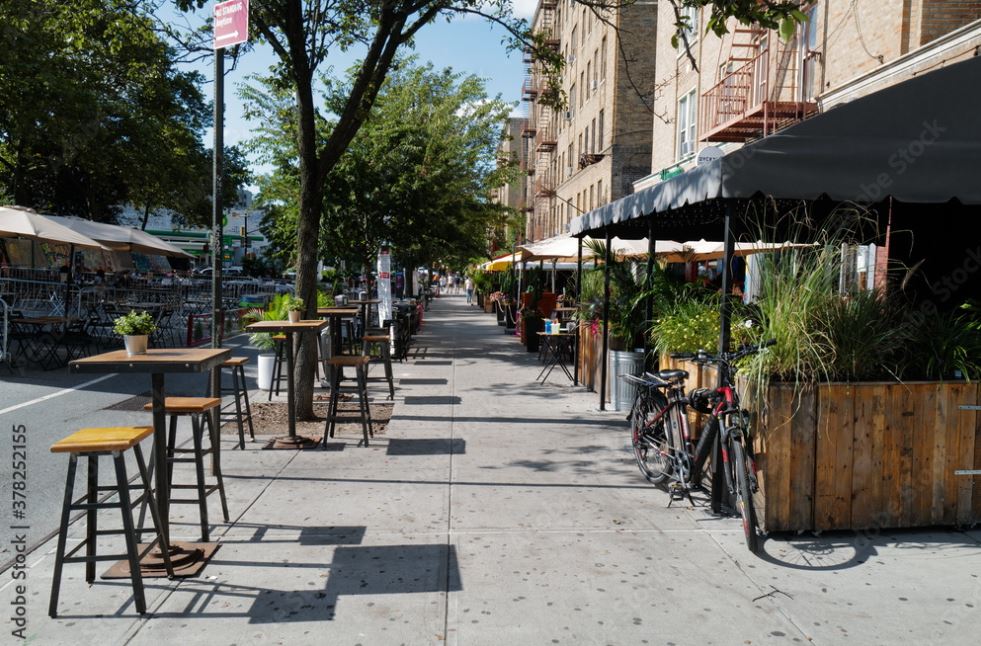Join VTC Director Robert Noland on May 12th for a pre-summit panel of the International Transport Forum 2021 Summit. The title of this year’s summit is Transport Innovation for Sustainable Development.
Professor Noland will present on “Public views on the reallocation of street space and walking during and after the COVID-19 pandemic.”
Date: May 12, 2021
Time: 15:15 – 16:30 Central European Summer Time (CEST)
9:15 – 10:30 AM EST
See ITF2021 Summit for more information
Many towns and cities throughout the US and the world have reallocated street space in response to the COVID-19 pandemic. This was done to allow more social distancing for those walking and using other active modes of travel, and also to provide space for restaurants to offer outdoor dining. This research uses data collected via an online Qualtrics panel of New Jersey residents to evaluate how these street closures were viewed. Did people take advantage of the opportunity to dine outside? Was walking more attractive with more space? How did respondents feel about changes in traffic patterns due to the closures? Did people walk more frequently and longer distances, and how did this behavior correlate with views on street closures?
Results of this analysis, to date, suggest that there is broad public support for these types of interventions that allow for more walking and more lively town centers (about 40-45% of respondents). In New Jersey, many towns are considering making these changes permanent and there is broad support for this as well. A minority of respondents indicated disagreement with the street closures, believing that they increase congestion and that outdoor dining makes it more difficult to walk (about 35% of respondents). Additional work, not yet completed, will explore whether these views are correlated with demographic measures and residence location.
The New Jersey Department of Transportation is generally opposed to these changes, citing a 1955 law that requires streets to be maintained as throughways for vehicle traffic. Any permanent change requires a full traffic impact analysis and could likely lead to the removal of the street closure, despite public support. This suggests that the lack of traction in improving walkable environments has to do with deeply entrenched systems, politics, and institutional practices. Specifically, there is an overarching tradition of traffic forecasting that a) largely ignores modes apart from automobiles, and b) is accompanied by virtually zero consideration of public desires. We suggest that the current groundswell of support for street changes represents a rare opportunity that could be harnessed to overcome these forces and implement street design changes that support pedestrians and outdoor activities, and thus lead to more sustainable urban mobility in the post-Covid 19 recovery.
Robert B. Noland is Distinguished Professor at the Edward J. Bloustein School of Planning and Public Policy and serves as the Director of the Alan M. Voorhees Transportation Center and Director of the PhD program in Planning and Public Policy. He received his PhD at the University of Pennsylvania in Energy Management and Environmental Policy. Prior to joining Rutgers University he was Reader in Transport and Environmental Policy at Imperial College London, a Policy Analyst at the US Environmental Protection Agency and also conducted post-doctoral research in the Economics Department at the University of California at Irvine. The focus of Dr. Noland’s research is the impacts of transportation planning and policy on both economic and environmental outcomes. Work on economic effects has included examining behavioral reactions to changes in reliability, associations with the built environment, and trip chaining behavior. Environmental work includes impacts on safety, climate, health, and other factors associated with overall quality of life. Active research areas include evaluation of traffic safety data and how safety modeling is used in economic assessment and planning of infrastructure; analysis of the costs and benefits of road diet conversions; analysis of walking behavior and links to other travel behavior and the built environment; analysis of climate change impacts on accessibility; and, evaluation of bike-sharing systems. Dr. Noland’s research has been cited throughout the world in debates over transport infrastructure planning and environmental assessment of new infrastructure. Dr. Noland is currently the co-Editor-in-Chief of Transportation Research part D (Transport and Environment) and Associate Editor of the International Journal of Sustainable Transportation and was formerly the Chair of the Transportation Research Board Special Task Force on Climate Change and Energy.
